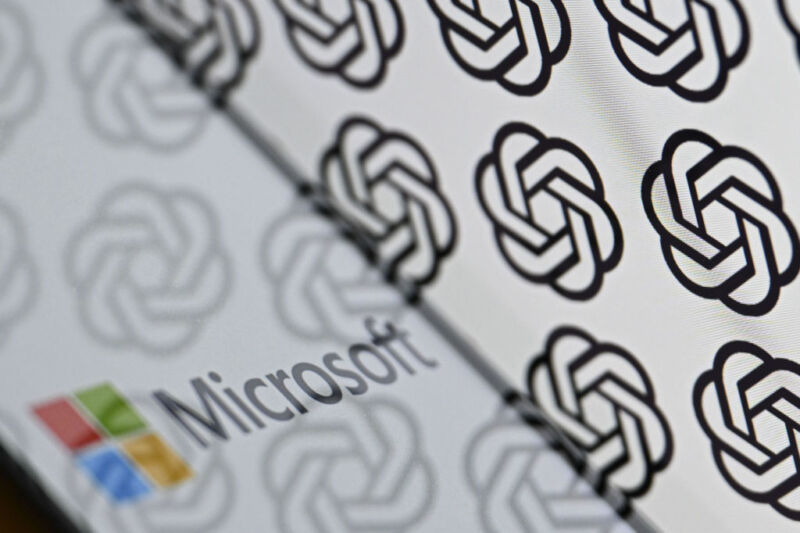Under Microsoft’s thumb? —
EU is fielding comments on potential market harms of Microsoft’s investments.

European Union regulators are concerned that Microsoft may be covertly controlling OpenAI as its biggest investor.
On Tuesday, the European Commission (EC) announced that it is currently “checking whether Microsoft’s investment in OpenAI might be reviewable under the EU Merger Regulation.”
The EC’s executive vice president in charge of competition policy, Margrethe Vestager, said in the announcement that rapidly advancing AI technologies are “disruptive” and have “great potential,” but to protect EU markets, a forward-looking analysis scrutinizing antitrust risks has become necessary.
Hoping to thwart predictable anticompetitive risks, the EC has called for public comments. Regulators are particularly keen to hear from policy experts, academics, and industry and consumer organizations who can identify “potential competition issues” stemming from tech companies partnering to develop generative AI and virtual world/metaverse systems.
The EC worries that partnerships like Microsoft and OpenAI could “result in entrenched market positions and potential harmful competition behavior that is difficult to address afterwards.” That’s why Vestager said that these partnerships needed to be “closely” monitored now—”to ensure they do not unduly distort market dynamics.”
Microsoft has denied having control over OpenAI.
A Microsoft spokesperson told Ars that, rather than stifling competition, since 2019, the tech giant has “forged a partnership with OpenAI that has fostered more AI innovation and competition, while preserving independence for both companies.”
But ever since Sam Altman was bizarrely ousted by OpenAI’s board, then quickly reappointed as OpenAI’s CEO—joining Microsoft for the brief time in between—regulators have begun questioning whether recent governance changes mean that Microsoft’s got more control over OpenAI than the companies have publicly stated.
OpenAI did not immediately respond to Ars’ request to comment. Last year, OpenAI confirmed that “it remained independent and operates competitively,” CNBC reported.
Beyond the EU, the UK’s Competition and Markets Authority (CMA) and reportedly the US Federal Trade Commission have also launched investigations into Microsoft’s OpenAI investments. On January 3, the CMA ended its comments period, but it’s currently unclear whether significant competition issues were raised that could trigger a full-fledged CMA probe.
A CMA spokesperson declined Ars’ request to comment on the substance of comments received or to verify how many comments were received.
Antitrust legal experts told Reuters that authorities should act quickly to prevent “critical emerging technology” like generative AI from being “monopolized,” noting that before launching a probe, the CMA will need to find evidence showing that Microsoft’s influence over OpenAI materially changed after Altman’s reappointment.
The EC is also investigating partnerships beyond Microsoft and OpenAI, questioning whether agreements “between large digital market players and generative AI developers and providers” may impact EU market dynamics.
Microsoft observing OpenAI board meetings
In total, Microsoft has pumped $13 billion into OpenAI, CNBC reported, which has a somewhat opaque corporate structure. OpenAI’s parent company, Reuters reported in December, is a nonprofit, which is “a type of entity rarely subject to antitrust scrutiny.” But in 2019, as Microsoft started investing billions into the AI company, OpenAI also “set up a for-profit subsidiary, in which Microsoft owns a 49 percent stake,” an insider source told Reuters. On Tuesday, a nonprofit consumer rights group, the Public Citizen, called for California Attorney General Robert Bonta to “investigate whether OpenAI should retain its non-profit status.”
A Microsoft spokesperson told Reuters that the source’s information was inaccurate, reiterating that the terms of Microsoft’s agreement with OpenAI are confidential. Microsoft has maintained that while it is entitled to OpenAI’s profits, it does not own “any portion” of OpenAI.
After OpenAI’s drama with Altman ended with an overhaul of OpenAI’s board, Microsoft appeared to increase its involvement with OpenAI by receiving a non-voting observer role on the board. That’s what likely triggered lawmaker’s initial concerns that Microsoft “may be exerting control over OpenAI,” CNBC reported.
The EC’s announcement comes days after Microsoft confirmed that Dee Templeton would serve as the observer on OpenAI’s board, initially reported by Bloomberg.
Templeton has spent 25 years working for Microsoft and is currently vice president for technology and research partnerships and operations. According to Bloomberg, she has already attended OpenAI board meetings.
Microsoft’s spokesperson told Ars that adding a board observer was the only recent change in the company’s involvement in OpenAI. An OpenAI spokesperson told CNBC that Microsoft’s board observer has no “governing authority or control over OpenAI’s operations.”
By appointing Templeton as a board observer, Microsoft may simply be seeking to avoid any further surprises that could affect its investment in OpenAI, but the CMA has suggested that Microsoft’s involvement in the board may have created “a relevant merger situation” that could shake up competition in the UK if not appropriately regulated.